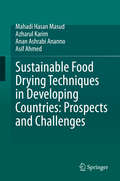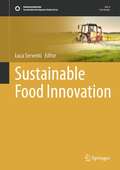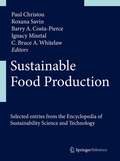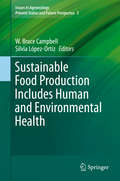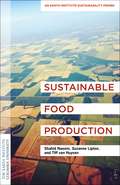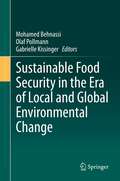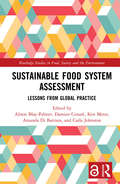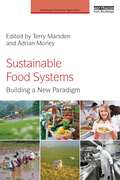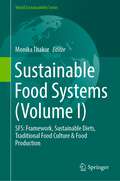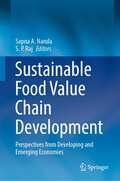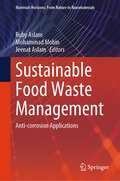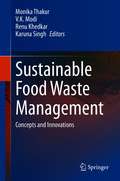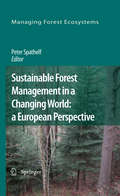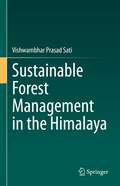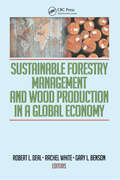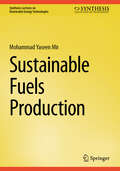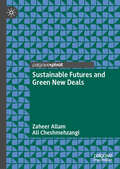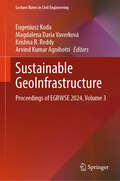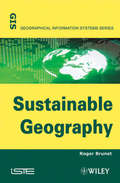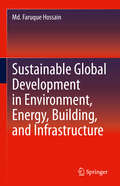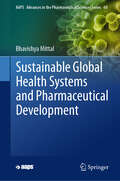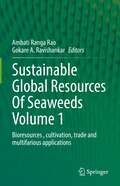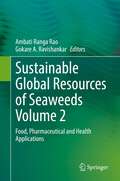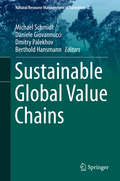- Table View
- List View
Sustainable Food Drying Techniques in Developing Countries: Prospects and Challenges
by Azharul Karim Mahadi Hasan Masud Anan Ashrabi Ananno Asif AhmedThis book presents a comprehensive review of renewable energy-based sustainable drying techniques for developing countries. Aspiring towards a world with zero food waste, the book has provided discussion on sustainable drying techniques in terms of energy efficiency. The socio-economic condition of each developing country is unique; therefore, has specific technological requirements. As such, the book presents discussions on food waste scenario around the world, the socio-economic status of developing countries and their correlation with food. The book gives an overview of the quality aspects of drying, along with the required energy and time to retain these features. Additionally, a method of selecting drying techniques for developing countries, taking the cost and safety factor into consideration, has been discussed extensively Also, the renewable and non-renewable energy resources of low income, lower-middle income, middle income, and high-income developing countries have been analyzed and presented. The book also highlights the available drying techniques that are currently being practiced by the consumers and industries of developing countries. The book recommends ten sustainable drying technologies for the developing countries and describes their working principle. Discussion on potential challenges for sustainable drying technology adoption is also presented. The book presents up-to-date research on sustainable drying techniques and their impact on developing countries to reduce food waste.Food waste is not only a humanitarian concern but also a threat to environmental sustainability. Currently, one-third of all produced food is being wasted, when nearly 805 million people - including children remain undernourished on a daily basis. In an effort to solve this crisis, a number of food preservations techniques are being practiced in food supply chain. Drying is one such preservation technique that prevents microbial proliferation, slows enzymatic reaction and preserves the physio-chemical properties of food. Albeit, drying is an effective means of food preservation; it is also highly energy-intensive. Developing countries do not have sufficient energy and financial resources to adopt conventional (expensive and high energy) drying techniques. As such, this is the first reference work dedicated to discussing the prospects and challenges of sustainable (renewable energy based and inexpensive) drying techniques for developing countries in order to reduce food waste. Sustainable food drying techniques in developing countries: Prospects and Challenges is a singular work in the field of food preservation and affordable drying technology.
Sustainable Food Innovation (Sustainable Development Goals Series)
by Luca ServentiThis text offers a holistic approach to the two topics of the highest interest in the current and future food industry: sustainability and nutrition. The current knowledge is narrow and specific to individual topics focusing on either one nutrient or one discipline. Food is part of a wide circle of disciplines: nutrition, technology, sensory, environmental aspects, psychology, economy, culture and society. In the recent years, the sales of innovative foods such as meatless burgers, allergen-free products and personalized nutrition have skyrocketed. Sustainable Food Innovation presents the big picture on each nutrient: industrial and natural sources (ingredients, food products), consumer acceptability (price, sensory quality) and nutritional properties (quantity and quality) with each chapter focusing on a specific essential nutrient. Further chapters illustrate the role of other elements of interest such as bioactive. In addition, experimental data is added to enrich the book. Online discussions on current food trends are analyzed and presented to the reader in the effort to understand consumers’ psychology. This will be the first publication to combine literature review and research data and the first to offer a comprehensive discussion on sustainable food innovation. The ultimate goal is to educate consumers and experts, providing technical and socioeconomic knowledge in a multidisciplinary context. Ultimately, informed technologists will develop healthier, sustainable food products and informed consumers will make informed decisions on nutrition and food choices.
Sustainable Food Production
by Barry Costa-Pierce Bruce Whitelaw Ignacy Misztal Paul Christou Roxana SavinGathering some 90 entries from the Encyclopedia of Sustainability Science and Technology, this book covers animal breeding and genetics for food, crop science and technology, ocean farming and sustainable aquaculture, transgenic livestock for food and more.
Sustainable Food Production Includes Human and Environmental Health
by W. Bruce Campbell Silvia López-OrtízAgroecology not only encompasses aspects of ecology, but the ecology of sustainable food production systems, and related societal and cultural values. To provide effective communication regarding status and advances in this field, connections must be established with many disciplines such as sociology, anthropology, environmental sciences, ethics, agriculture, economics, ecology, rural development, sustainability, policy and education, or integrations of these general themes so as to provide integrated points of view that will help lead to a sustainable construction of values. Such designs are inherently complex and dynamic, and go beyond the individual farm to include landscapes, communities, and biogeographic regions by emphasizing their unique agricultural and ecological values, and their biological, societal, and cultural components and processes.
Sustainable Food Production: An Earth Institute Sustainability Primer (Columbia University Earth Institute Sustainability Primers)
by Dr. Shahid Naeem Suzanne Lipton Tiff van HuysenIndustrial agriculture is responsible for widespread environmental degradation and undermines the pursuit of human well-being. With a projected global population of 10 billion by 2050, it is urgent for humanity to achieve a more sustainable approach to farming and food systems.This concise text offers an overview of the key issues in sustainable food production for all readers interested in the ecology and environmental impacts of agriculture. It details the ecological foundations of farming and food systems, showing how knowledge from the natural and social sciences can be used to create sustainable alternatives to the industrial production methods used today. Beginning with a discussion of the role of agriculture in human development, the primer examines how twentieth-century farming methods are environmentally and socially unsustainable, contributing to global change and perpetuating inequalities. The authors explain the principles of environmental sustainability and explore how these principles can be put into practice in agrifood systems. They emphasize the importance of human well-being and insist on the centrality of social and environmental equity and justice.Sustainable Food Production is a compelling guide to how we can improve our ability to feed each other today and preserve the ability of our planet to do so tomorrow. Appropriate for a range of courses in the natural and social sciences, it provides a comprehensive yet accessible framework for achieving agricultural sustainability in the Anthropocene.
Sustainable Food Security in the Era of Local and Global Environmental Change
by Mohamed Behnassi Gabrielle Kissinger Olaf PollmannThis volume discusses a broad range of vital issues encompassing the production and consumption of food in the current period of climate change. All of these add up to looming, momentous challenges to food security, especially for people in regions where malnutrition and famine have been the norm during numerous decades. Furthermore, threats to food security do not stop at the borders of more affluent countries - governance of food systems and changes in eating patterns will have worldwide consequences. The book is arranged in four broad sections. Part I, Combating Food Insecurity: A Global Responsibility opens with a chapter describing the urgent necessity for new paradigm and policy set to meet the food security challenges of climate change. Also in this section are chapters on meat and the dimensions of animal welfare, climate change and sustainability; on dietary options for mitigating climate change; and the linkage of forest and food production in the context of the REDD+ approach to valuation of forests. Part II, Managing Linkages Between Climate Change and Food Security offers a South Asian perspective on Gender, Climate Change and Household Food Security; a chapter on food crisis in sub-Saharan Africa; and separate chapters on critical issues of food supply and production in Nigeria, far-Western Nepal and the Sudano-Sahelian zone of Cameroon. Part III examines Food Security and patterns of production and consumption, with chapters focused on Morocco, Thailand, Bahrain, Kenya and elsewhere. The final section discusses successful, innovative practices, with chapters on Food Security in Knowledge-Based Economy; Biosaline Agriculture in the Gulf States; Rice production in a cotton zone of Benin; palm oil in the production of biofuel; and experiments in raised-bed wheat production. The editors argue that technical prescriptions are insufficient to manage the food security challenge. They propose and explain a holistic approach for adapting food systems to global environmental change, which demands the engagement of many disciplines - a new, sustainable food security paradigm.
Sustainable Food System Assessment: Lessons from Global Practice (Routledge Studies in Food, Society and the Environment)
by Damien Conaré Blay-Palmer Alison Ken Meter Carla Johnston Amanda BattistaSustainable Food System Assessment provides both practical and theoretical insights about the growing interest in and response to measuring food system sustainability. Bringing together research from the Global North and South, this book shares lessons learned, explores intended and actual project outcomes, and highlights points of conceptual and methodological convergence. Interest in assessing food system sustainability is growing, as evidenced by the Milan Urban Food Policy Pact and the importance food systems initiatives have taken in serving as a lever for attaining the UN Sustainable Development Goals. This book opens by looking at the conceptual considerations of food systems indicators, including the place-based dimensions of food systems indicators and how measurements are implicated in sense-making and visioning processes. Chapters in the second part cover operationalizing metrics, including the development of food systems indicator frameworks, degrees of indicator complexities, and practical constraints to assessment. The final part focuses on the outcomes of assessment projects, including impacts on food policy and communities involved, highlighting the importance of building connections between sustainable food systems initiatives. The global coverage and multi-scalar perspectives, including both conceptual and practical aspects, make this a key resource for academics and practitioners across planning, geography, urban studies, food studies, and research methods. It will also be of interest to government officials and those working within NGOs.
Sustainable Food Systems: Building a New Paradigm (Earthscan Food and Agriculture)
by Terry Marsden Adrian MorleyIn response to the challenges of a growing population and food security, there is an urgent need to construct a new agri-food sustainability paradigm. This book brings together an integrated range of key social science insights exploring the contributions and interventions necessary to build this framework. Building on over ten years of ESRC funded theoretical and empirical research centered at BRASS, it focuses upon the key social, economic and political drivers for creating a more sustainable food system. Themes include: regulation and governance sustainable supply chains public procurement sustainable spatial strategies associated with rural restructuring and re-calibrated urbanised food systems minimising bio-security risk and animal welfare burdens. The book critically explores the linkages between social science research and the evolving food security problems facing the world at a critical juncture in the debates associated with not only food quality, but also its provenance, vulnerability and the inherent unsustainability of current systems of production and consumption. Each chapter examines how the links between research, practice and policy can begin to contribute to more sustainable, resilient and justly distributive food systems which would be better equipped to ‘feed the world’ by 2050.
Sustainable Food Systems: SFS: Framework, Sustainable Diets, Traditional Food Culture & Food Production (World Sustainability Series)
by Monika ThakurSustainable Food System is a food system that delivers food safety & security as two key elements and nutrition for masses having impact on their social, economic, and environmental bases to generate nutritional food security for future generations shall not be compromised. Therefore, SFS targets the economic sustainability, social sustainability and environmental sustainability and makes a robust system having expansive benefits for the society. This concept of Sustainable Food System under SDG Goals is such a vast concept that, it has been impossible to highlight all the concepts in one volume. Therefore, the Editor have compiled this voluminous, comprehensive and compendious approach as balanced and organized structure of work as: Sustainable Food System Volume I & II.The Sustainable Food System (Volume - I): framework, sustainable diets, Traditional Food Culture & Food production has a very comprehensive outline and divided in 4 major sections and further 24 different chapters. The book addresses both the theoretical and applied aspects of sustainable food diverse food systems A Sustainable Food System (SFS) is a comprehensive food system that targets the sustainable diets, traditional food culture with indigenous system and the overall food production on as well. All chapters in different sections will be written by key scientists with diverse backgrounds in either industry / R&D / academia, and will provide an update on emerging ideas and sustainable technologies as well as vision for the future. The 1st section: Sustainable Food System: concepts & framework primarily focusing on the Sustainable food systems, its conceptual introduction, framework and different concepts nationally & internationally. The 2nd section: Responsible consumption and sustainable diets deals with different aspects of nutrients sustaining health & sustainable diets. The 3rd section: Conservation and promotion of Traditional Food Culture, covers the conservation & promotion of traditional food cultures & their practices. The last & 4th section: Climate change and sustainable food production provide the current knowledge and innovative developments related to climate change, nutritional security & agronomic bio-fortification.
Sustainable Food Value Chain Development: Perspectives from Developing and Emerging Economies
by Sapna A. Narula S. P. RajThe book addresses the gap that exists in sustainable value chain development in the context of developing and emerging economies in meeting the sustainable development goals. The book adopts a holistic approach and discusses significant aspects of the topic such as challenges, opportunities, best practices, technology and innovation, business models, and policy formulation. The chapters focus on all the existing and potential actors in the value chain. Comprising invited chapters from leading researchers, policymakers, practitioners, and academicians working on this topic, this edited book is useful for scientists, researchers, students, research scholars, and practitioners as it builds the latest interdisciplinary knowledge in the area. An important aspect of the book is the case studies of already ongoing projects from various emerging economies around the world. Contributions are divided into four sections—sustainable food systems and circular economy: tackling resource use, efficiency, food loss, and waste problems; technology and innovation for food value chain development; toward responsible food consumption; linking small farmers to markets: markets, institutions, and trade. Significantly, the book is organized in the context of Sustainable Development Goals and has direct relevance and linkages with SDG 1 (poverty alleviation), SDG 2 (zero hunger), SDG 3 (good health and well-being), SDG 4 (quality education), SDG 5 (gender equality), SDG 12 (responsible consumption and production), SDG 13 (climate action), and SDG 17 (partnerships).
Sustainable Food Waste Management: Anti-corrosion Applications (Materials Horizons: From Nature to Nanomaterials)
by Mohammad Mobin Jeenat Aslam Ruby AslamThis book highlights established research and technology on corrosion inhibitors and bio-waste management. It further discusses emerging aspects of utilizing food waste in the field of corrosion inhibition. The topics covered include overview on bio-waste and their management, different types of food waste (i.e., agricultural, vegetable and fruit/fruit juice, plant waste, slaughterhouse trash), and their application as corrosion inhibitors and mitigation of corrosion. It also discusses economic aspects and commercialization of food waste as corrosion inhibitors. The book is a valuable reference for beginners, researchers, and professionals working in the areas of sustainability, food waste management, and material science.
Sustainable Food Waste Management: Concepts and Innovations
by Karuna Singh Monika Thakur V. K. Modi Renu KhedkarThis book discusses one of the biggest challenges of the food industry, which is waste management. Food industries generate high amounts of waste, both solid and liquid, resulting from the production, processing and consumption of food. Stringent environmental legislators have made the task of waste management more challenging. Through the three sections of this book, the readers are introduced to the different types of wastes generated, utilization of waste through food processing industry and sustainable waste management technologies. The different chapters describe how the biomass and the valuable nutrients from food industry wastes could be used to develop value-added products. The book reiterates that food wastes and their by-products are an excellent source of sugars, minerals, dietary fiber, organic acids, bio active compounds such as polyphenols, carotenoids and phytochemicals etc.This book is an excellent resource for industry experts, researchers and students in the field of food science, food processing and food waste management.
Sustainable Forest Management in a Changing World: A European Perspective (Managing Forest Ecosystems #19)
by Peter SpathelfYet another book on the topic of ‘Sustainable Forest Management’ can only be justified by new information that is of direct relevance. The contents of this volume concentrate on the very latest factors and developments, thus, hopefully, contributing both to the book’s attractiveness and to closing gaps in the discipline’s database. This book is written for researchers in the field of forest management, international forestry, and climate change-related issues, legal and policy advisors, as well as for managers of private companies who deal with SFM. The authors of the various sections are scientists in the field of forestry and other environmental sciences. They represent different institutions, mainly universities and research agencies in Germany, but also high-level international institutions in development co-operation, such as the World Bank, FAO, and IIASA. The scope of the book is to refresh the meanings and perceptions of SFM against the background of the rapid changes in our natural and social environment. Climate change and the rapid increase of atmospheric CO concentration is a global process 2 with negative impacts of different kinds, among others on natural ecosystems such as forests. A crucial issue therefore is how forest management can contribute to forest conservation in light of changing climatic conditions. Moreover, policy changes such as the introduction of certification schemes and the new emphasis laid on Non-Wood Forest Products justify the re-evaluation of the role of SFM in delivering ecological goods and services from our forests.
Sustainable Forest Management in a Changing World: a European Perspective
by Peter SpathelfWith its 250-year history, Sustainable Forest Management (SFM) is now viewed as a model for managing forests worldwide. Yet despite the frequent use of the term there remain many questions concerning its meanings, criteria as well as its practical application. This book explores the current potential of SFM within the context of the rapid changes occurring in our natural and social environment, and examines the broad range issues - climate change, finance, governance, policy, certification, reduced-impact logging, non-timber products and services and stakeholder participation in land-use decisions - within the context of forest use, functions and conservation. With contributions from high-level representatives from the World Bank, FAO, IUCN and UNEP, as well as from leading academics - and including case studies from Europe and the tropics - this timely synthesis will provide a valuable reference for advanced students and researchers interested in forest and natural resource management, participatory and extension research, forest ecology and ecosystem services, functions and values, as well as for those involved in forest policy at local, regional and international levels. 'Every so often, a discipline should take stock where we are and where we are going. This book is doing that in a very timely manner. As we gain an appreciation of the magnitude and implications of future changes, the authors present views and ideas on a wide range of topics related to sustainable forest management. They provide a much needed overview of challenges in the face of climate and other aspects of global change. The book incorporates recent advances in a variety of fields and provides suggestions for solutions to important management problems that range from theoretical approaches to practical applications.' Klaus J. Puettmann, Department of Forest Ecosystems and Society, Oregon State University, Corvallis, USA.
Sustainable Forest Management in the Himalaya
by Vishwambhar Prasad SatiThis volume presents a comprehensive description of forests of the Uttarakhand Himalaya. It looks into the major drivers of forest depletion and suggests paths toward sustainable forest management. The book comprises thirteen chapters, which together describe forest land use/cover change; forest classification and working circles; national parks, wildlife sanctuaries, and conservation reserves; forest diversity and distribution; forest stocks and products; ecosystem goods and services; environmental index; drivers of forest degradation and conservation; climate change and forests; cultural and economic significance of forests, and sustainable forest management. The text is richly complemented by nearly seventy photographs and figures.
Sustainable Forestry Management and Wood Production in a Global Economy
by Rachel White Gary Benson Robert L DealA global view of responsible forestry management Sustainable Forestry Management and Wood Production in a Global Economy examines emerging issues and key strategies for sustaining wood production while maintaining other forest resources. Internationally recognized forestry experts explore a broad range of topics on sustainable forestry at t
Sustainable Fuels Production (Synthesis Lectures on Renewable Energy Technologies)
by Mohammad Yaseen MirThe ongoing energy transition emphasizes the advancement of zero-carbon fuels and low-carbon fuels, including biofuels and alcohol-based fuels, to achieve energy and environmental sustainability. However, it is crucial to assess the emissions and potential environmental impacts associated with these alternative energy sources. This book explores the role of sustainable fuels in reducing environmental pollution, with particular focus on second and third generation biofuels. It describes advances in sustainable fuel production technologies, examines the challenges posed by pollutants generated during their use, and presents strategies for managing these issues. Additionally, it discusses the importance of proper system operation and maintenance to ensure optimal performance.
Sustainable Futures and Green New Deals
by Ali Cheshmehzangi Zaheer AllamThis academic book critically examines the concept of sustainable futures and its interdependence with the policy framework of Green New Deals. We emphasize the inherent link between the two concepts by highlighting how Green New Deals can pave the way for a sustainable and just future in key areas such as environmental policy, economic development, and social equity. Taking a multidisciplinary approach, the book draws on insights from fields such as environmental studies, sustainable development, political ecology, and climate policy to explore the intricacies of these interconnections. The revised description underscores the importance of understanding the Green New Deal's historical and political contexts, as well as its implications for sustainable futures. The book delves into the theoretical perspectives that shape our comprehension of sustainable futures, the diverse strategies employed by countries and regions in implementing Green New Deals, the role of technological innovation and social movements in fostering sustainable transitions, and the political dynamics surrounding the Green New Deal. Through an analysis of the Green New Deal's role in sustainable development, climate policy, and environmental justice, the book provides a necessary and timely contribution to ongoing debates. The chapters offer detailed explorations of the interrelationships between these key areas, emphasizing how the Green New Deal can serve as a transformative policy framework for achieving sustainable and equitable futures. "Sustainable Futures and Green New Deals" is intended for scholars, policymakers, activists, and students interested in understanding the complex and interconnected issues surrounding sustainable development, climate policy, and environmental justice.
Sustainable GeoInfrastructure: Proceedings of EGRWSE 2024, Volume 3 (Lecture Notes in Civil Engineering #583)
by Krishna R. Reddy Arvind Kumar Agnihotri Eugeniusz Koda Magdalena Daria VaverkováThis volume contains peer-reviewed and selected papers presented during the International Conference on Environmental Geotechnology, Recycled Waste Materials, and Sustainable Engineering 2024, held in Warsaw, Poland. It covers the recent innovations, trends, concerns, practical challenges encountered, and the solutions adopted in waste management and engineering, geotechnical and geoenvironmental engineering, infrastructure engineering, and sustainable engineering. This book will be useful for academics, educators, policymakers, and professionals working in the field of civil engineering, chemical engineering, environmental sciences, and public policy.
Sustainable Geography (Wiley-iste Ser.)
by Roger BrunetSustainable Geography recalls the system and laws of geographical space production, tackles the hardcore of geography and presents models and organizations through a regional analysis and the dynamics of territorial structures and methods. The book also describes the general idea of discontinuities, trenches, the anti-dialectical and redivision-uniformity in the globalization and addresses the Transnational Urban Systems and Urban Network in Europe.
Sustainable Global Development in Environment, Energy, Building, and Infrastructure
by Md. Faruque HossainThis book emphasizes the comprehensive application of sustainability for all sectors of Environment, Energy, Building, and Infrastructure to secure a well-balanced world. Hence, the goal of this book is to define the context of instigation to think through the scientific theories and practical technical applications of the sustainable mechanism to confirm the global sustainability by implementation of the following six themes, Chapter 1: Introduction; Chapter 2: Sustainable Environment; Chapter 3: Sustainable Energy; Chapter 4. Sustainable Building; 5. Sustainable Infrastructure; Chapter 6: Conclusion; which are very much interconnected to secure the global sustainability. Consequently, the importance of the application of sustainability in all sectors of these six sectors has been expedited in this book considering the wise application of technologies by trickling down the advancement thoughts, research, and practices to achieve a broader result to build a better world.
Sustainable Global Health Systems and Pharmaceutical Development (AAPS Advances in the Pharmaceutical Sciences Series #60)
by Bhavishya MittalStrategic decision-making focusing on economics is the fundamental requirement to generate efficiency and improve productivity in any manufacturing environment. In the 21st century, the science of drug development is an established field that requires a dedicated and synergistic partnership between various subject matter experts. Unfortunately, pharmaceutical research is complicated, time-consuming, attritive, and costly, with development costs ranging from $4 billion to $11 billion per commercialized drug. There are more than 750 biotech and big pharma companies in the US that are developing new drug products for a vast number of therapeutic indications. Due to the high attrition rate in clinical trials, a small percentage of these drugs get commercialized. Still, a very high amount of resources are being spent on drug development from a societal perspective. Despite being an economically intense activity, the current state of drug product development makes a limited effort to integrate economics into product design and development. For example, pharmaceutical scientists are excellent at a data-driven decision-making process that requires technical elements and a few strategic elements. However, there is minimal integration of financial valuation elements (commonly employed in other high-tech industries such as fine chemicals, automotive, aerospace, etc.) into pharmaceutical drug development. Unfortunately, this hurts the sustainability of the health system of which these products will be a part in the future. A desirable future state integrates fundamentals of economics in product design and development so that the decision-making is parameterized, the cost of goods can be lowered, wastage can be reduced, patient-centricity is built into the design, and manufacturing/distribution efficiencies can be gained. The financial benefits of such an approach could allow for these savings to be passed on to the stakeholders and improve the value proposition of pharmaceuticals, which is critical to maintaining the innovation potential. This book hopes to introduce the reader to this desired future state of pharmaceutical drug development.
Sustainable Global Resources Of Seaweeds Volume 1: Bioresources , cultivation, trade and multifarious applications
by Gokare A. Ravishankar Ambati Ranga RaoMarine plant life is an abundant source of nutrients that enhance the daily diet. In recent years, consuming diets rich in seaweeds or their extracts have been shown to provide health benefits due to being rich in macronutrients, micronutrients and nutraceuticals. The commercial value of seaweeds for human consumption is increasing annually, and some countries harvest several million tons annually. The seaweeds industry is valued at around $12 billion in 2017, and supports millions of families worldwide. Seaweeds production grew globally by 30 million tons in 2016. Seaweeds have seen increasing usage in the food industry due to their abundance of beneficial nutrients, vitamins and ω–3 fatty acids. To date there have been no books that comprehensively cover up-to-date information on seaweeds cultivation, processing, extraction and nutritional properties. This text lays out the properties and effects of seaweeds from their use as bioresources to their use in the feed industry to their applications in wastewater management and biofuels. Sustainable Global Resources Of Seaweeds Volume 1: Industrial Perspectives offers a complete overview of seaweeds from their cultivation and processing steps to their bioactive compounds and Industrial applications, while also providing the foundational information needed to understand these plants holistically. Chapters in this volume focus on seaweeds bioresources, ecology and biology, composition and cultivation, plus usage of seaweeds extracts for the feed industry. An entire section is dedicated to waste water treatment, bioremediation, biofuel and biofertilizer application of seaweeds. For any researcher in need of a comprehensive and up-to-date single source on seaweeds cultivation, this volume provides all the information necessary to gain a thorough understanding of this ever-important product.
Sustainable Global Resources of Seaweeds Volume 2: Food, Pharmaceutical and Health Applications
by Gokare A. Ravishankar Ambati Ranga RaoMarine plant life is an abundant source of nutrients that enhance the daily diet. In recent years, consuming diets rich in seaweeds or their extracts have been shown to provide health benefits due to being rich in macronutrients, micronutrients and nutraceuticals. The commercial value of seaweeds for human consumption is increasing annually, and some countries harvest several million tons annually. The seaweeds industry is valued at around $12 billion in 2017, and supports millions of families worldwide. Seaweeds production grew globally by 30 million tons in 2016. Seaweeds have seen increasing usage in the food industry due to their abundance of beneficial nutrients, vitamins and ω–3 fatty acids. To date there have been no books that comprehensively cover up-to-date information on seaweeds cultivation, processing, extraction and nutritional properties. This text lays out the properties and effects of seaweeds from their use as bioresources to their use in the feed industry to their applications in wastewater management and biofuels. Sustainable Global Resources of Seaweeds Volume 2: Industrial Perspectives offers a complete overview of the application of seaweeds into food, pharmaceuticals and other health-based applications. The first section focuses on the various foods derived from seaweeds, including extensive insight into the beneficial nutrients these plants contain. The many functional foods derived from sea plants are covered in detail, including foods from tropical seaweeds, macroalgae, Monostroma, Caulerpa, Palmaria, Gracillaria, Porphyra, Laminaria, Fucus, Undaria, and many more. The chapters delve further into the nutritional makeup of these foods, their health benefits and chemical makeup. A second section is dedicated to the pharmaceutical applications of seaweeds and their many health benefits. With chapters devoted to vitamin sources, health properties and pharmaceutical applications, this section acts as a single source for researchers exploring the pharmaceutical applications and possibilities of seaweeds. Research, development, and commercial applications are explored, plus a complete picture of the multitude of health benefits derived from these plentiful and beneficial plants. For researchers in search of a comprehensive and up-to-date source on the application of nutrient-rich seaweeds from across the world into novel foods and pharmaceuticals, look no further than this volume.
Sustainable Global Value Chains (Natural Resource Management in Transition #2)
by Robert AtkinsonValue chains are a vital part of how our world operates, yet we are only beginning to understand how to make them sustainable. This volume addresses the crux of that challenge by presenting a broad array of options for understanding and managing the complexity of sustainability initiatives that affect, and are also influenced by value chains. Its chapters present diverse perspectives on both political and private sector governance, including governmental regulations and private standards, and embrace the emergent and critical value of innovative approaches to monitoring and evaluating progress. Finally, the volume offers a review of concrete examples for transformation and transition towards more sustainable value chains in selected sectors, including, amongst others, agriculture, forestry, mining, and tourism.
